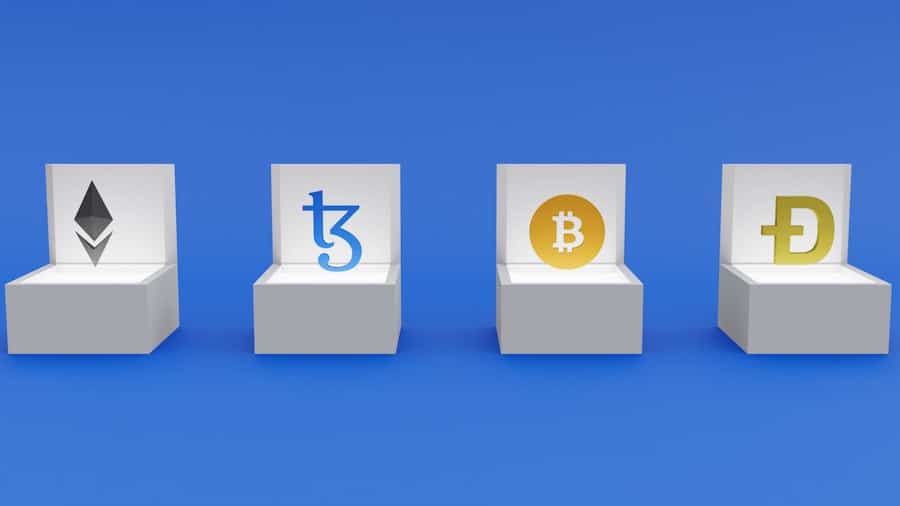Blockchain technology has emerged as a transformative force across various sectors, with its roots deeply embedded in the realm of cryptocurrencies. At its core, blockchain is a decentralized ledger system that records transactions across multiple computers in such a way that the registered transactions cannot be altered retroactively. This characteristic of immutability, combined with transparency and security, makes blockchain an appealing solution for industries that require reliable data management.
The technology operates on a peer-to-peer network, where each participant has access to the entire database, ensuring that no single entity has control over the information. This decentralized nature not only enhances security but also fosters trust among users, as every transaction is verifiable by all parties involved. In the healthcare sector, the potential applications of blockchain are vast and varied.
The industry is plagued by issues such as data breaches, inefficiencies in record-keeping, and challenges related to interoperability among different health systems. As healthcare continues to evolve towards a more digital landscape, the integration of blockchain technology could address many of these pressing concerns. By providing a secure and efficient means of managing health records, blockchain has the potential to revolutionize how patient data is stored, shared, and utilized, ultimately leading to improved patient outcomes and streamlined healthcare processes.
Key Takeaways
- Blockchain technology is a decentralized and secure way of storing and sharing digital information.
- Secure digital health records are crucial for maintaining patient privacy and ensuring accurate medical information.
- Blockchain ensures data security and integrity through encryption, decentralization, and consensus mechanisms.
- Blockchain plays a key role in enabling interoperability of health records across different healthcare providers and systems.
- Using blockchain for digital health records offers advantages such as improved data security, transparency, and efficiency.
The Importance of Secure Digital Health Records
The significance of secure digital health records cannot be overstated in today’s healthcare environment. With the increasing digitization of patient information, healthcare providers are tasked with safeguarding sensitive data against unauthorized access and cyber threats. Health records contain a wealth of personal information, including medical histories, treatment plans, and billing details.
A breach of this data can lead to identity theft, fraud, and significant harm to patients’ privacy. Therefore, ensuring the security of these records is paramount for maintaining patient trust and complying with regulations such as the Health Insurance Portability and Accountability Act (HIPAA) in the United States. Moreover, secure digital health records facilitate better patient care by enabling healthcare providers to access accurate and up-to-date information quickly.
When health records are fragmented across different systems or stored in an insecure manner, it can lead to delays in treatment and miscommunication among providers. A secure and centralized system allows for seamless sharing of information, which is crucial for coordinated care, especially in emergency situations where timely access to a patient’s medical history can be life-saving. As healthcare continues to embrace digital transformation, the need for robust security measures becomes increasingly critical to protect both patients and providers.
How Blockchain Ensures Data Security and Integrity

Blockchain technology inherently provides a high level of data security through its unique structure and cryptographic principles. Each block in a blockchain contains a list of transactions that are time-stamped and linked to the previous block, creating a chain of blocks that is resistant to tampering. Once a block is added to the chain, altering any information within it would require changing all subsequent blocks, which is computationally impractical due to the consensus mechanisms employed by the network.
This ensures that once data is recorded on the blockchain, it remains immutable and trustworthy. Additionally, blockchain employs advanced cryptographic techniques to secure data. Each participant in the network has a unique cryptographic key that allows them to access and interact with the blockchain while maintaining their anonymity.
This means that sensitive health information can be shared securely without exposing personal identifiers. Furthermore, smart contracts—self-executing contracts with the terms of the agreement directly written into code—can automate processes such as consent management for data sharing. This not only enhances security but also ensures that patients have control over who accesses their information and under what circumstances.
The Role of Blockchain in Interoperability of Health Records
Interoperability—the ability of different health information systems to communicate and exchange data effectively—is a significant challenge in modern healthcare. Many healthcare providers use disparate systems that do not easily share information with one another, leading to fragmented care and inefficiencies. Blockchain technology can play a pivotal role in enhancing interoperability by providing a standardized framework for data exchange across various platforms.
By utilizing blockchain as a universal ledger for health records, disparate systems can connect through a common interface that allows for seamless data sharing while maintaining security and privacy. For instance, when a patient visits multiple healthcare providers, their health records can be updated in real-time on the blockchain, ensuring that all parties have access to the most current information.
As healthcare organizations increasingly recognize the importance of interoperability, blockchain stands out as a viable solution to bridge gaps between different systems.
Advantages of Using Blockchain for Digital Health Records
The advantages of implementing blockchain technology for digital health records are manifold. One of the most significant benefits is enhanced security. With traditional databases being vulnerable to hacking and unauthorized access, blockchain’s decentralized nature provides an additional layer of protection against cyber threats.
The use of cryptographic keys ensures that only authorized individuals can access sensitive information, thereby reducing the risk of data breaches. Another advantage is improved patient empowerment and engagement. Blockchain allows patients to have greater control over their health data by enabling them to grant or revoke access to their records at will.
This transparency fosters trust between patients and healthcare providers, as individuals can see who has accessed their information and for what purpose. Additionally, patients can easily share their health records with specialists or other providers without the cumbersome process often associated with traditional record-sharing methods. This not only streamlines care but also encourages patients to take an active role in managing their health.
Challenges and Limitations of Implementing Blockchain in Health Records

Despite its numerous advantages, implementing blockchain technology in health records is not without challenges. One significant hurdle is the lack of standardization across different blockchain platforms. As various organizations develop their own blockchain solutions tailored to specific needs, interoperability between these systems can become problematic.
Without universally accepted standards for data formats and protocols, achieving seamless integration across diverse platforms remains a complex issue. Moreover, there are regulatory concerns surrounding the use of blockchain in healthcare. The healthcare industry is heavily regulated, with strict guidelines governing patient privacy and data security.
Integrating blockchain into existing frameworks requires careful consideration of these regulations to ensure compliance while still leveraging the benefits of decentralized technology. Additionally, there is a need for widespread education and training among healthcare professionals regarding blockchain technology to facilitate its adoption effectively.
Case Studies of Successful Implementation of Blockchain in Health Records
Several organizations have begun exploring the potential of blockchain technology in managing health records with promising results. One notable example is MedRec, a project developed by researchers at MIT Media Lab. MedRec utilizes blockchain to create a decentralized system for managing electronic health records (EHRs).
By allowing patients to control their own health data while enabling providers to access necessary information securely, MedRec aims to improve care coordination and patient engagement significantly. Another case study involves Guardtime, which partnered with Estonia’s government to implement blockchain technology for its national health system. By using blockchain to secure health records, Estonia has created a system where patients can access their medical history while ensuring that healthcare providers have real-time access to accurate data.
This initiative has not only enhanced data security but also streamlined administrative processes within the healthcare system.
The Future of Blockchain in Revolutionizing Digital Health Records
Looking ahead, the future of blockchain technology in revolutionizing digital health records appears promising yet complex.
The evolution of regulatory frameworks will also play a crucial role in determining how quickly blockchain can be integrated into mainstream healthcare practices.
Furthermore, advancements in related technologies such as artificial intelligence (AI) and machine learning could complement blockchain’s capabilities in managing health records. For instance, AI algorithms could analyze vast amounts of data stored on blockchains to identify trends or predict patient outcomes more accurately. As these technologies converge, they may pave the way for more personalized and efficient healthcare solutions.
In conclusion, while there are hurdles to overcome before blockchain can be fully integrated into digital health records management, its potential to enhance security, interoperability, and patient empowerment makes it an exciting area for future exploration and development within the healthcare sector.
In a recent article on Wired.com, the focus was on how emerging technologies are shaping various industries, including healthcare. The article delves into the potential of blockchain technology in revolutionizing the way digital health records are managed and secured. This aligns with the discussion on The Role of Blockchain in Enabling Seamless and Secure Digital Health Records, highlighting the importance of leveraging innovative solutions to enhance data privacy and interoperability in the healthcare sector.
FAQs
What is blockchain technology?
Blockchain technology is a decentralized, distributed ledger system that records transactions across multiple computers in such a way that the recorded data cannot be altered retroactively. It is the underlying technology behind cryptocurrencies like Bitcoin, but its potential applications extend far beyond digital currencies.
How does blockchain enable seamless and secure digital health records?
Blockchain technology can enable seamless and secure digital health records by providing a tamper-proof and transparent system for recording and sharing patient data. It allows for secure and efficient data exchange between different healthcare providers, while ensuring the integrity and privacy of the information.
What are the benefits of using blockchain for digital health records?
Using blockchain for digital health records offers several benefits, including enhanced security and privacy, improved interoperability between different healthcare systems, reduced administrative costs, and increased transparency and trust in the healthcare system.
What are the challenges of implementing blockchain in healthcare?
Challenges of implementing blockchain in healthcare include regulatory and legal concerns, interoperability with existing systems, scalability issues, and the need for standardization and consensus among different stakeholders in the healthcare industry.
Are there any real-world examples of blockchain being used in healthcare?
Yes, there are several real-world examples of blockchain being used in healthcare, such as the use of blockchain for managing electronic health records, clinical trials, supply chain management, and medical billing and claims processing. These applications demonstrate the potential of blockchain to transform the healthcare industry.

